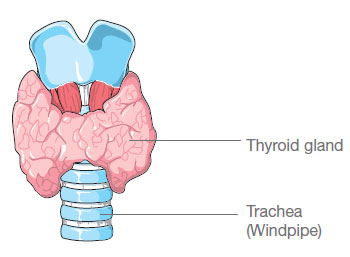Thyroid Disease
What is Thyroid disease
Thyroid disorders occur more commonly with increasing age. If you have a thyroid problem, it doesn’t necessarily mean that you will miss out on a happy and healthy life. This pamphlet provides information about the role of your thyroid. It also provides information about the symptoms, causes, and treatment of thyroid diseases that are common in older patients. As with any healthcare issue, always talk to your health provider about your particular situation.
What is the thyroid, and why is it important?
The thyroid is an endocrine gland that plays a key role in regulating growth, development, and normal function of the body.1 It is a butterfly-shaped gland located in the front of your neck. The thyroid can affect your heart rate, your emotional state, your feelings of tiredness and hunger, and the condition of your skin and hair. In fact, your thyroid influences most cells in your body.
Your thyroid controls your body’s functions by making several hormones, including thyroxine (T4), which is converted to triiodothyronine (T3).1 If you do not get enough iodine in your diet, your thyroid cannot produce enough T3 and T4. The amounts of T3 and T4 released into the bloodstream:
• Regulate the body’s ability to turn food into energy
• Affect rates of tissue growth
• Affect the function of organ systems throughout the body
The amount of thyroid hormones released by the thyroid gland is monitored and controlled by the pituitary gland which releases thyroid-stimulating hormone (TSH) when the thyroid hormone levels are too low.1 When your thyroid is functioning normally, TSH levels are relatively low.
What thyroid diseases occur in older patients?
With thyroid disease, thyroid hormones are either over-produced or under-produced. Symptoms may differ in older patients compared to younger adult patients.2 Treatment may need to be adjusted for the effects of age, the presence of other health conditions, and medications being taken. Diseases of the thyroid gland include1,3:
• Hypothyroidism – Not enough thyroid hormone is produced
• Hashimoto’s disease – An autoimmune disease that causes the thyroid to produce too little thyroid hormone, causing hypothyroidism
• Hyperthyroidism – Too much thyroid hormone is produced
• Graves’ disease – An autoimmune disease that causes the thyroid to produce too much thyroid hormone, causing hyperthyroidism
• Goiter – Enlargement of the thyroid gland
• Thyroid nodules – Growth of thyroid tissue causing circular or oval-shaped lumps in the thyroid gland
• Thyroid cancer – Growth of the thyroid gland, either goiter or thyroid nodules, that becomes cancerous
Hypothyroidism and aging
People with hypothyroidism may experience some of these symptoms or may not notice symptoms at all. You may have few or no symptoms or you may mistake symptoms for the expected effects of aging.2 With an examination, your doctor may detect additional signs of the disease such as slowed heart rate and goiter. Signs and symptoms of hypothyroidism include3,4:
• Depression • Decreased concentration • Puffy face • Coarseness or loss of hair • Hoarseness • Muscular pain • Brittle nails • Cold intolerance • Cholesterol abnormalities • Fatigue • Mental impairment • Goiter • Slow heartbeat • Dry or yellow skin • Infertility • Irregular or heavy menses • Constipation • Reflex delay • Weight gain from fluid retention.

